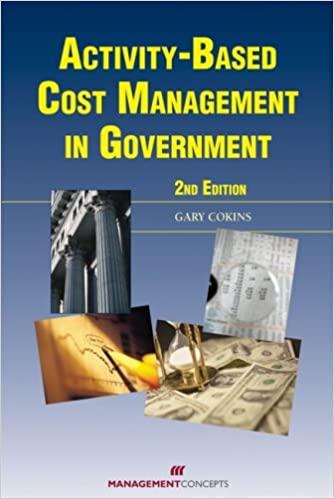Question
MANAGERIAL ACCOUNTING I need help with these questions, im just lost thats all. 1. Overhead costs actually incurred in production are recorded in such a
MANAGERIAL ACCOUNTING
I need help with these questions, im just lost thats all.
1. Overhead costs actually incurred in production are recorded in such a way to:
A. Increase Work-in-process
B. Decrease Work-in-process
c. Increase Manufacturing Overhead
d. Decrease Manufacturing Overhead
2. A product, which cost $100 in manufacturing, has been sold for $120 for cash. For this transaction,
which of the following is a correct accounting treatment?
A. Increase Cost of goods sold by $120
B. Decrease Sales revenue by $120
C. Decrease Finished goods by $100
d. Increase cash by $20
3. Which of the following is true about Under-applied overhead?
a. It creates a problem because it eventually over-states cost of goods sold.
b. It should be disposed of by increasing Cost of goods sold.
C. It makes total manufacturing costs over-stated.
D. It implies that the debit side of the Manufacturing Overhead account is smaller than its credit side.
4. In July, I started making 1 unit of a product. I spent $200, but it was not finished. In August, I finished the unit which was started in July. For that unit, I incurred another $100. Also, I started making 6 more units. Of those 6 units, 4 were finished and two units were not. For the four finished units, I incurred $1,200 (for the four together). For the two unfinished units, I incurred $500 (for the two together). For August, my Cost of Goods Manufactured was:
a. $1,200
B. $1,300
C. $1,500
D. $1,700
E. $1,800
F. $2,000
5. I made a product at a cost of $120. I incurred a $10 cost in advertising the product. Then, I sold the
product at a price of $180. My Cost of Goods Sold was:
A. $60 B. $120 C. $130 D. $50
6. The following data are given for a period (Amounts are all in $):
| Beginning | Ending | For period | |
| Raw Materials | 100 | 250 | |
| Work In Process | 3,000 | 2,400 | |
| Finished Goods | 6,000 | 9,300 | |
| Raw (direct) Materials used: | 3,500 | ||
| Direct labor | 5,000 | ||
| Manufacturing Overhead | 7,000 |
The amount of Cost of Goods Manufactured is:
A. $5,400 B. $15,500 C. $16,100 D. $18,300
7. Use the same information given above.The amount of Cost of Goods Sold is:
a. $2,100 B. $12,200 C. $12,800 D. $15,000
8. A company applies overhead on the basis of direct labor hours ($12 per direct labor hours). At the beginning of a period, there were no inventories. The actual amount of overhead incurred during the period was $330. No product was sold during the period. The following additional information is available:
| product | Direct Material Cost | Direct labor cost | Actual Direct labor Hours | Job Status |
| 201 | $140 | $450 | 15 hrs | Complete |
| 202 | $200 | $300 | 10 hrs | Complete |
| 203 | $320 | $150 | 4 hrs | Incomplete |
At the end of the period, the Work-in-Process account shows what amount? ______________
9. A company actually incurred $10,000 depreciation cost in producing many different products. For this depreciation, the appropriate journal entry will be:
A. dr. Depreciation expense 10,000
cr Accumulated depreciation 10,000
B. dr Manufacturing overhead 10,000
cr Accumulated depreciation 10,000
C. dr. Depreciation expense 10,000
cr Cash 10,000
D. dr Administrative Expense 10,000
cr. Accumulated depreciation 10,000
10 . the following amounts are shown as T-accounts:
Debit side credit side
| raw materials | |
| 100* | |
| 500 | |
| x | |
| 200** |
Debit side credit side
| manufacturing overhead | |
| 300 | |
| 320 |
Debit Side credit side
| work-In Process | |
| 900* | 1,800 |
| 3,000 | |
| 2,100** |
Debit side credit side
| Finished Goods | |
| 2,000* | |
| 1,800 | |
| 3,800** |
* and ** represent beginning and ending balances, respectively.
Which of the following is not true?
A. Raw materials used in production amounted $400.
B. Manufacturing overhead was over-applied.
C. Cost of goods manufactured was $1,800.
D. The total manufacturing costs incurred for the period were $3,900.
11. The main document that summarizes costs assigned to a particular job in job-order costing is called
A. Production report B. Job-cost sheet C. Bill of costs
12. Which of the following companies is not likely to use job-order costing?
A. Law firm B. Custom furniture C. Electric power plant
The following information relates to Questions 13 through 15.
| the following data are given for the period: | |
| Estimated (budgeted) Manufacturing overhead cost | $60,000 |
| Actual manufacturing overhead cost | $67,000 |
| Estimated Activity Base | 3,000 machine hours |
| Actual Activity Base | 3,300 machine hours |
13. Calculate the predetermined overhead rate. _________________
14. What is the amount of applied overhead (manufacturing overhead applied to production) is: $_________
15. Manufacturing overhead is:
A Under-applied by $1,000
b. Over-applied by $6,000
c. Over-applied by $7,000
d. Neither over-applied nor under-applied
Step by Step Solution
There are 3 Steps involved in it
Step: 1

Get Instant Access to Expert-Tailored Solutions
See step-by-step solutions with expert insights and AI powered tools for academic success
Step: 2

Step: 3

Ace Your Homework with AI
Get the answers you need in no time with our AI-driven, step-by-step assistance
Get Started


